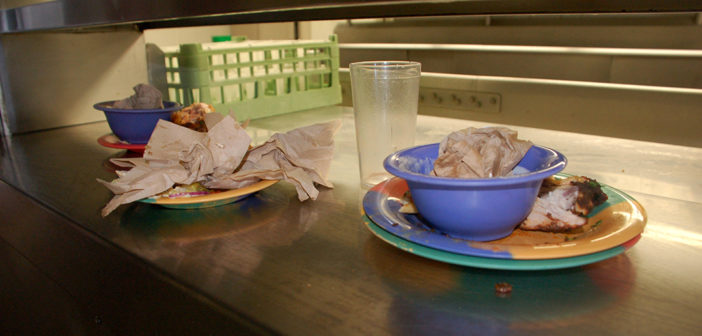Lehigh Dining Services and Sodexo are implementing new programs and using technology to minimize post-consumer waste and leftover food. The Federal Bill Emerson Good Samaritan Food Donation Act has allowed Lehigh Dining to donate leftovers to local food banks through its new food recovery system.
Lauren Sleeger, the director of Rathbone, has led the initiative to limit waste in Lehigh dining halls. The steps and procedures used to limit waste begin before food is produced. At Rathbone, meals are made in batches and statistics are used to anticipate the amount of food that will be consumed.
The Good Samaritan Act now allows Lehigh Dining Services to recollect food prepared for consumption and donate the food to the food recovery network. David Joseph, the executive director of Student Auxiliary Services, assists the program, along with several students who pick up and deliver the food.
Sleeger or an executive chef first decides whether food is safe enough to be packaged and donated. If food is deemed fit to be donated, it is packaged in disposable containers and either stored in a freezer or delivered to New Bethany Ministry or Second Harvest Food Bank.
“Once a week a group of student volunteers pick (the food) up and drive it down,” said Sharon Sangermano, ’17, a student volunteer for the food recovery network. “Our first recovery was on Friday and we brought 15 trays that held 85 pounds worth of food.”
Sleeger said donating untouched and recovered food limits leftover food. However, post-consumer waste still remains an issue at Lehigh. New technology has helped the university limit post-consumer waste.
This year, Rathbone acquired the Enviropure system, which breaks down organic waste in about 24 hours and converts it into gray water, or clean waste water. Sleeger said this food digester is not new to the industry but uses environmentally-friendly, natural bacteria instead of chemicals.
Sleeger said after organic waste is processed by the machine, the gray water can then be flushed through a drainage system and released into the environment without causing harm. Even though Lehigh has this system, students are still encouraged to limit their waste.
Lehigh limits waste by offering students made-to-order meals, which are sold in Upper Cort. The proportions of these meals are limited, rather than the unlimited buffet-style meals served in Rathbone.
Collin Messics, ’18, the house manager of Phi Delta Theta, said food at fraternities and sororities commonly sits out for a few hours before being stored away. Messics said it is difficult to salvage food at Greek houses.
As a house manager, Messics is responsible for ensuring as much food as possible is saved for reuse.
“If there is any leftover food, we wrap it and put it in the fridge and typically it gets eaten,” Messics said. “Once it reaches that point, it stays for maybe another two to three days but after that we do throw away a lot of food.”
Sleeger said she has hired a student sustainability intern to support and engage other students.
“We will have different materials out around the dining hall and we have different signage up on the digital screens, but at some point it becomes information overload,” Sleeger said. “So that’s where we are really hoping to connect with the sustainability office and have our sustainability interns try to strategically target different times and events so that we are maximizing our impact.”
During the week of Oct. 10, Lehigh Dining Services initiated the Zero Waste Challenge between the University Center dining halls and Rathbone. The competition encouraged students to eat all of the food on their plates in an effort to minimize waste.






Comment policy
Comments posted to The Brown and White website are reviewed by a moderator before being approved. Incendiary speech or harassing language, including comments targeted at individuals, may be deemed unacceptable and not published. Spam and other soliciting will also be declined.
The Brown and White also reserves the right to not publish entirely anonymous comments.
1 Comment
Hey Tanner and The Brown and White,
My name is Hannah, and I work at Food Recovery Network. Based on my knowledge of working with Lehigh University and Sharon, I think you refer to our organization a couple of times in this article. Do you think you could edit “the food recovery network” to reflect our title? You can find more information about us on our website: http://www.foodrecoverynetwork.org/
Cheers,
hc